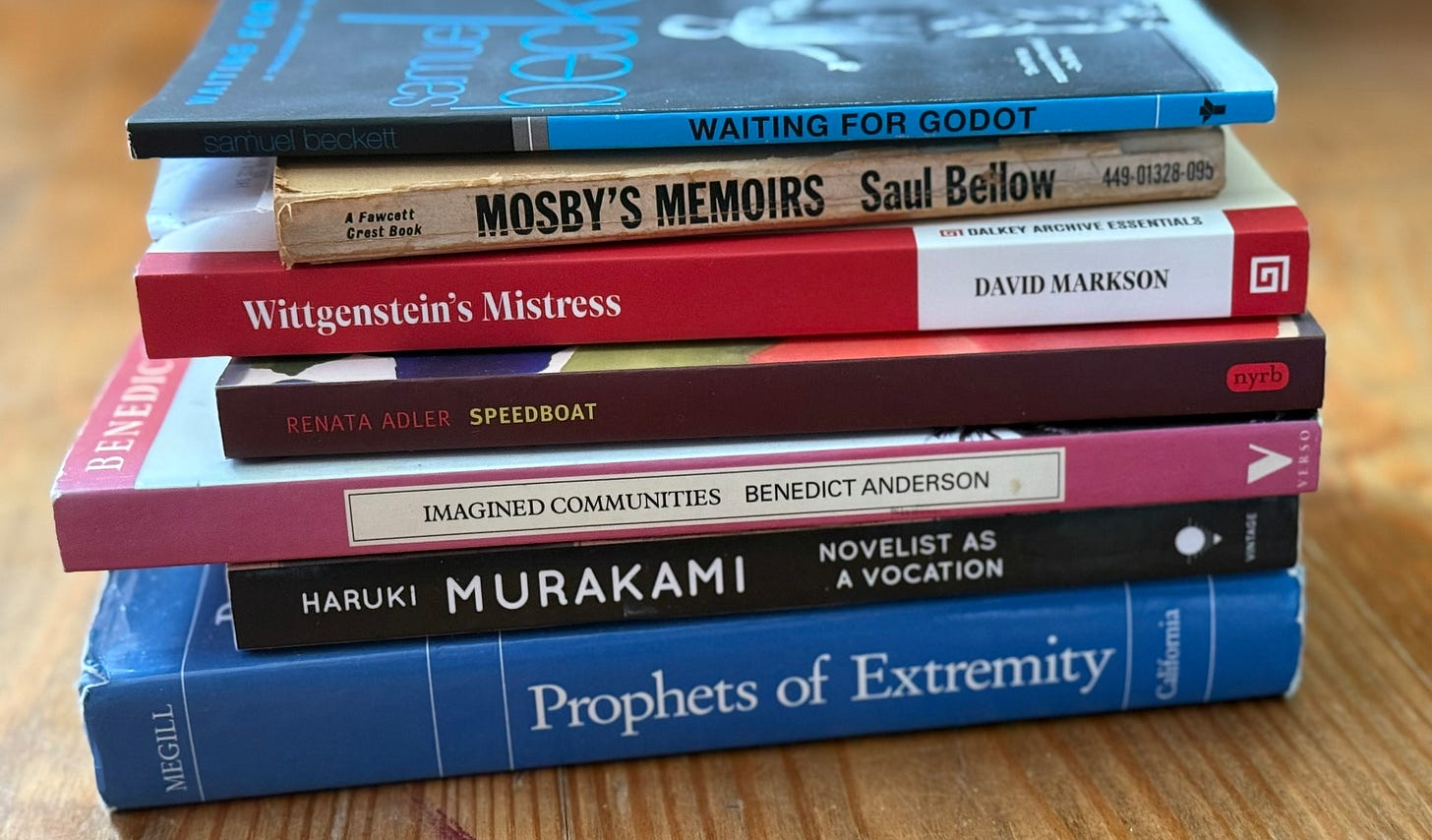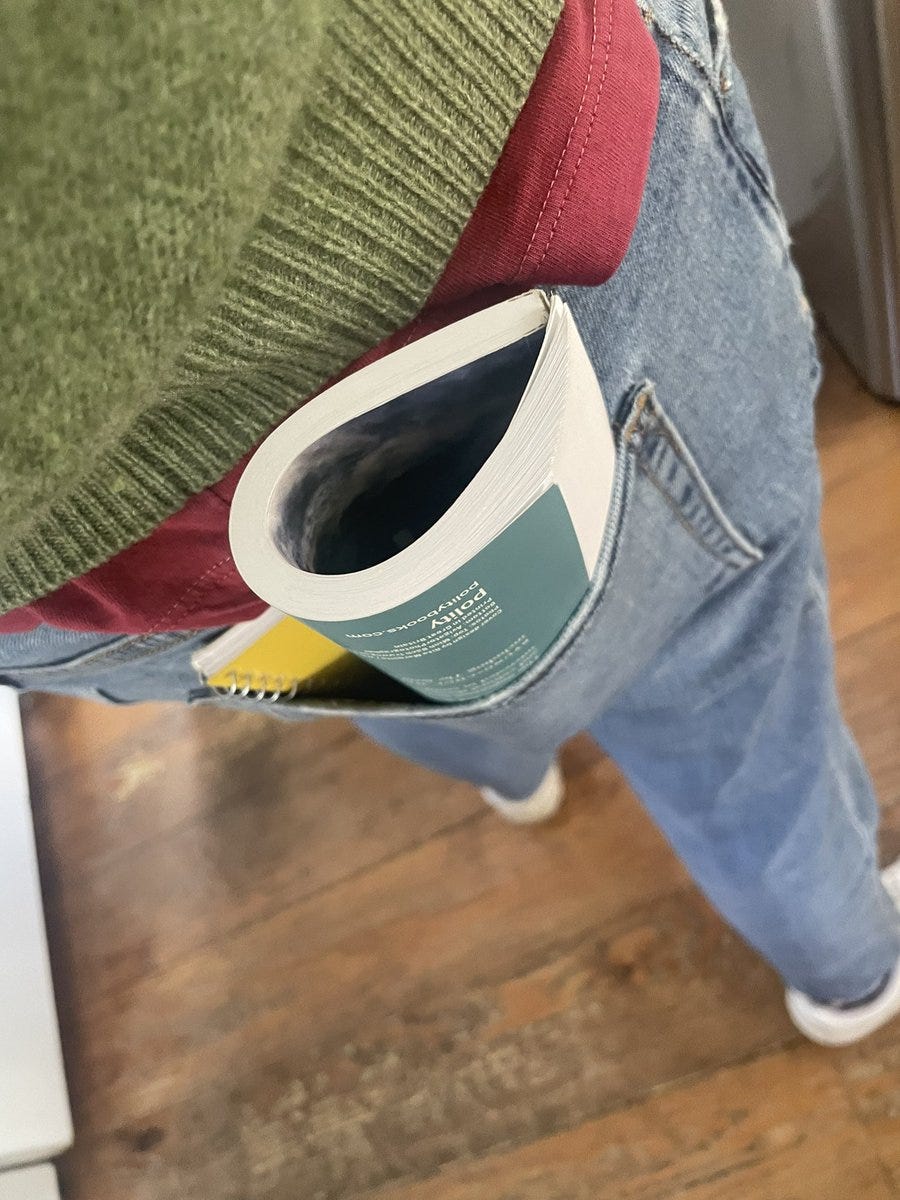This is not advice on how to read more. That’s out there, I am sure, but I’m not qualified to give it. First of all, I have not been reading that much for that long—just a couple of months—and it is easy to imagine myself reading a lot less in the future. Second of all, I find that people who post online about how much they read are usually obnoxious, both aesthetically and morally, and especially when it turns out they’re reading three different editions of “The 48 Laws of Power” or whatever vaguely-manipulative turn-your-life-around-and-get-rich book is popular at the moment.1 There are, however, people that really want to read more and don’t feel like they know where to start. Or they read already, and don’t know what to change to read more.
I have stumbled on a method that works for me; it makes a certain kind of reading (politics, philosophy, literature, classics) easier and more consistent. These are my strategies and the reasons I have them. I hope you will steal what works for you and ignore the rest.
1. Reading multiple books at once
When I suggest people read more than one book, people often tell me it’s just not possible for them. I hear that reading several books at once makes a reader confused, lose interest in some of the books, or any number of other problems. I think people are radically underestimating themselves in this regard. I know I did. But try thinking about how many tv plots you keep track of at once, or how many news stories you can follow easily over days, weeks, months, and decades. When I read enough, it became a non-issue to read more than one thing at once. It was a question of training myself into it, not disposition.
I began with just one fiction book and one non-fiction book, and I added more over time. Finding the motivation to read in the age of limitless distraction is punishing. I found my brain wired so tightly for attention that I had to take consistent “phone breaks” every few paragraphs at the start. It was useful to have options when I found myself with time to read, so that if philosophy wasn’t capturing my attention, a spy novel could. Lots of book-options made reading a little more competitive in my head with the internet and its steady supply of C8H11NO2 and hydroxytriptomine at my fingertips at all times. Books don’t have it easy.
The last week of September, I read seven books in seven days.2 That sounds a lot more impressive than it was. I did not finish all of these books on the same day I picked them up, finishing one after another for seven days straight. I didn’t even start and finish them that week. A couple I finished in one day, and the rest built up over the course of weeks or even months. Once I began to read enough books at once, finishing several a week came about as easily as setting aside the time to read them. My favorite part of this strategy is that I never have to grit my teeth and push myself to read a book I don’t want to, eventually I get through each in their own time.
2. Reading different kinds of books
This comes right out of my last point. To make reading exciting for myself, I tried to make it a place where lots of my interests could be expressed. “Reading” eventually ceased to be a hobby in and of itself. Instead, it complements or acts as a component of my interests: philosophy, politics, literature, music, baseball, etc. It intersects with them. In order to read more, I integrated reading into my life.
In the list of readings from that week (this is gonna be the kind of writing where you need to read the footnotes, by the way. The list of books was in the second one. This very text right here would usually be a footnote). I read a novel, a play, an essay collection, a book of political science and philosophy, and a short story collection. My reading of these overlapped and crisscrossed, and there are books I read over this week that didn’t get finished during it. Some are still unfinished—I try not to worry about it.
At first, it wasn’t easy to find a wide array of books I actually wanted to read. I stuck with authors and genres I already liked, reading a few recommendations from friends along with them. A natural expanse of text gradually opened itself up to me. I learned to double down on authors and subjects that sent a spark to my brain. Books that are referenced in one work have started to scream at me from the used bookstore shelves. I discovered, basically, that I’ve had my own taste in books this whole time.
3. Spending a lot of time reading
Unfortunately, reading takes time, and there’s no substitute. This sucks and I wish it weren’t true. I am lucky that I read fast—though certainly that’s a skill that developed too—but nonetheless, I have to read for hours every day to keep up my pace. And as you saw in my list of “perfect week books,” quite a number of them are awfully short!3 I haven’t found any other short-cuts yet. If I want to read a lot, I have to spend a lot of time on it.
# 4. Always carrying a book with me
Book twitter (is that a thing? It sounds better than “a bunch of nerds” on twitter—and let me be clear I am also a nerd on twitter—so I’m gonna stick with it) once got FURIOUS with me, perhaps fairly, because I revealed my habit of folding books in half and putting them into my back pocket.
The mob was not wrong that it’s hard on the book. Perhaps they weren’t even wrong that this is going to send me to hell. If you’re worried about that sorts of things, book-pocketing might not be for you. But when I have a book with me at all times, I am so much more likely to read. It was all about building the habit.
5. Abandoning a book when it’s not catching me
Like I said, I beat the hell out of my books. It’s no big deal not to finish them. The book doesn’t care and neither do I.
6. Setting aside time to read (and not quitting early!)
Some people say page goals work better for them. I don’t set goals at all now, but setting the time early on was crucial for building my “momentum.”
7. Setting time limits for apps on my phone (at minimum)
I completely deleted video streaming apps off of my phone when I decided I wanted to get serious about reading more.4 Twitter, my most serious addiction, has an “time limit” set which I’m too embarrassed to share publicly. Progress on that front, too, however, has been made.
8. Reading every day
For like fifteen minutes at least.
Conclusion
I would be happy if this helped anyone whatsoever. You should feel free to share your own strategies in the comments. Please let me know if you liked any of the books I mentioned too—a future subscribers-only post will feature several of them. And please: read. It’s really, really fun.
Interestingly, I have only seen one person in real life reading that book. He had a smooth and shiny bald white dome and a flaming Irish beard. As you might expect, he was the kind of person who was quick to tell me about the women he had slept with and difficult to trust on the exact same subject.
Here were the titles:
Wittgenstein’s Mistress by David Markson
Waiting for Godot by Samuel Beckett
Salvador by Joan Didion
Novelist as a Vocation by Haruki Murakami
Prophets of Extremity: Nietzsche, Heidegger, Derrida, Foucault by Allan Megill
Mosby’s Memoirs and Other Stories by Saul Bellow
Imagined Communities: Reflections on the Origin and Spread of Nationalism by Benedict Anderson
For example, I read Waiting for Godot, the play, in only an hour. (Then I read it again, in another hour, but you wouldn’t have to do that unless you wanted to.) It just doesn’t take very long to read plays. Honestly, if you just want to max out the number of books you read, plays might be a good option.
Confession: I redownloaded YouTube after about four months, because I had been using it for guitar tutorials on the YouTube web page on the chrome app on my phone for months and I felt ridiculous. I can feel it wasting more and more of my time now, though, so I might have to delete it again.







Smh I will not accept 48 Laws of Power slander: the book is terrible but it's a knowing cash grab by a subject matter expert who knows better than the sociopathic superfans
I've watched like 14 movies in a week. Checkmate reader.